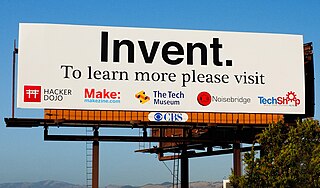
"Do it yourself" ("DIY") is the method of building, modifying, or repairing things by oneself without the direct aid of professionals or certified experts. Academic research has described DIY as behaviors where "individuals use raw and semi-raw materials and parts to produce, transform, or reconstruct material possessions, including those drawn from the natural environment ". DIY behavior can be triggered by various motivations previously categorized as marketplace motivations, and identity enhancement.

Harford County is located in the U.S. state of Maryland. As of the 2020 census, the population was 260,924. Its county seat is Bel Air. Harford County is included in the Baltimore-Columbia-Towson, MD Metropolitan Statistical Area, which is also included in the Washington-Baltimore-Arlington, DC-MD-VA-WV-PA Combined Statistical Area.

A hackathon is an event where people engage in rapid and collaborative engineering over a relatively short period of time such as 24 or 48 hours. They are often run using agile software development practices, such as sprint-like design wherein computer programmers and others involved in software development, including graphic designers, interface designers, product managers, project managers, domain experts, and others collaborate intensively on engineering projects, such as software engineering.
Joppa is a former colonial town and current planning region of Harford County, Maryland, United States. Joppa was founded as a British settlement on the Gunpowder River in 1707 and designated as the third county seat of Baltimore County in 1712. The original boundaries of Baltimore County were defined in 1659 and contained all of modern day Baltimore County, Baltimore City, Harford and Cecil counties and parts of Howard, Carroll, Anne Arundel and Kent counties. The settlement was named for the Biblical town of Jaffa in the ancient Holy Land of modern-day Israel. Joppa's harbor began to silt in due to clearcutting and farming upriver and coupled with multiple outbreaks of diseases such as smallpox and malaria, the county seat was moved to the growing, deep water port of Baltimore in 1768. Joppa's population would decline rapidly thereafter and businesses left for more prosperous environments in the new Baltimore Town.

Hamilton Hills is a mixed-use suburban neighborhood located in the northeastern corner of Baltimore City, Maryland. Hamilton Hills represents a section of Hamilton, a larger historic area that includes other neighborhoods in Northeast Baltimore. The neighborhood's borders are Old Harford Road and Harford Road to the east, Echodale Avenue to the south, Perring Parkway to the west and the Baltimore County line to the north. The main thoroughfare in Hamilton Hills is Harford Road, which has been an integral part of the area's history.

Achievement Academy, officially Achievement Academy at Harbor City High School, is a public alternative high school located in Baltimore, Maryland, United States. The school currently resides in the former Northern High School campus, at 2201 Pinewood Avenue. Achievement Academy is an alternative school program operated by Baltimore City Public Schools to serve students with severe academic and/or behavior issues.

The Metalab is a hackerspace in Vienna's central first district. Founded in 2006, it is a meeting place of the Viennese tech community, hosting events from cultural festivals to user groups. It has played a catalyst role in the global hackerspace movement and was the birthplace of several internet startup companies.

Mitch Altman is a Berlin-based hacker and inventor of TV-B-Gone. He is a featured speaker at hacker conferences, an international expert on the hackerspace movement, and teaches introductory electronics workshops. He is also Chief Scientist and CEO of Cornfield Electronics.
Old Harford Road, one of the oldest continuously used rights-of-way in central Maryland, United States, is a southwest–northeast thoroughfare in northeast Baltimore City and eastern Baltimore County.

A hackerspace is a community-operated, often "not for profit", workspace where people with common interests, such as computers, machining, technology, science, digital art, or electronic art, can meet, socialize, and collaborate. Hackerspaces are comparable to other community-operated spaces with similar aims and mechanisms such as Fab Lab, men's sheds, and commercial "for-profit" companies.
TOG is a hackerspace in Dublin, Ireland. tóg is a word in the Irish language; one of its meanings is 'to build or construct'.

The maker culture is a contemporary subculture representing a technology-based extension of DIY culture that intersects with hardware-oriented parts of hacker culture and revels in the creation of new devices as well as tinkering with existing ones. The maker culture in general supports open-source hardware. Typical interests enjoyed by the maker culture include engineering-oriented pursuits such as electronics, robotics, 3-D printing, and the use of computer numeric control tools, as well as more traditional activities such as metalworking, woodworking, and, mainly, its predecessor, traditional arts and crafts.

Noisebridge is an anarchistic maker and hackerspace located in San Francisco. It is inspired by the European hackerspaces Metalab in Vienna and c-base in Berlin. Noisebridge describes itself as "a space for sharing, creation, collaboration, research, development, mentoring, and learning". Outside of its headquarters, Noisebridge forms a wider international community. It was organized in 2007 and has had permanent facilities since 2008.
Random Hacks of Kindness (RHoK) is a global community of technologists dedicated to solving problems for charities, non-profits and social enterprises by organising recurring Hackathons that has existed since 2009. The organisation currently has a presence in over 20 cities throughout 5 continents, and had 2000 participants in 2017.

Hackerspace.gr ('hsgr') is a hackerspace in Athens, Greece, established in 2011. It operates as a cultural center, computer laboratory and meeting place. Hackerspace.gr promotes creative coding and hardware hacking through its variety of activities. According to its website: "Hackerspace.gr is a physical space dedicated to creative code and hardware hacking, in Athens".
shackspace is a Stuttgart hackerspace run by shack e.V., a non-profit association, established in 2009. Originally located in North Stuttgart, it moved to Stuttgart-Wangen in March 2011. It is among the largest and fastest-growing hackerspaces in Germany, with over 110 paying members. The mission of shackspace is to foster an environment where people can collaborate on ideas, share knowledge and talents, and explore aspects of life including science, technology, software development, arts and crafts and anything else members express an interest in. shackspace views itself as not only a physical workspace, but also a community of like-minded people.
Geeks Without Bounds is a humanitarian organization of technologists, first responders, policymakers, and volunteers that work towards improving access to communication and technology. With a focus on working with communities that have limited infrastructure due to violence, negligence, or catastrophe, they organize hackathons for humanitarian technology, and help prototype projects intended to turn into long-term initiatives through their Accelerator for Humanitarian Projects.

GovHack is a significant annual open government and open data hackathon, attracting over 15,000 participants since 2009. First run as a small Canberra-based event, it quickly expanded to an international competition with simultaneous events taking place in major cities across Australia and New Zealand each year, with virtual events for remote and international participants. Since its inception, over 2,500 projects have been published by participants to demonstrate the practical value of open data.

MTF Labs is a series of innovation labs, festivals and events encouraging innovation through creative work, particularly music.

NYC Resistor is a restricted membership private club hackerspace with 25 members in New York, inspired by Chaos Computer Club and other hacker organizations. The New York Times describes it as "kind of frat house for modern-day mad scientists." Its own website describes itself as "NYC Resistor is a hacker collective with a shared space located in downtown Brooklyn. We meet regularly to share knowledge, hack on projects together, and build community."














